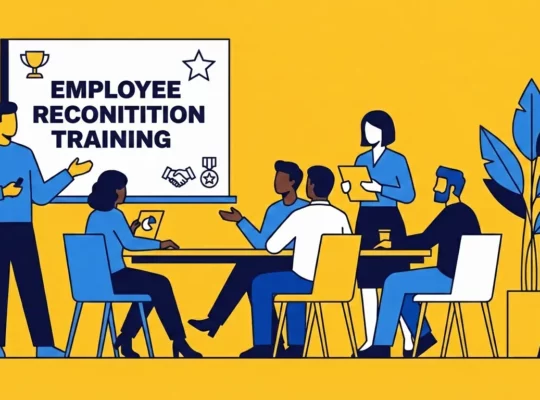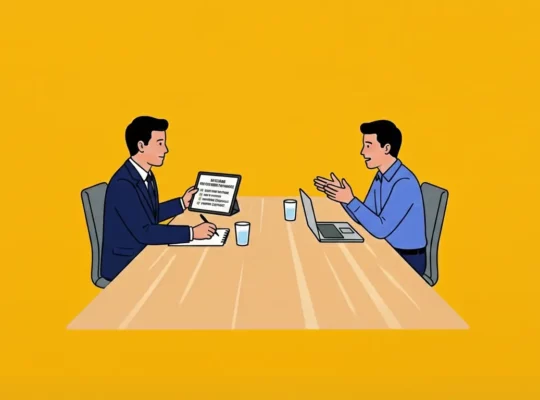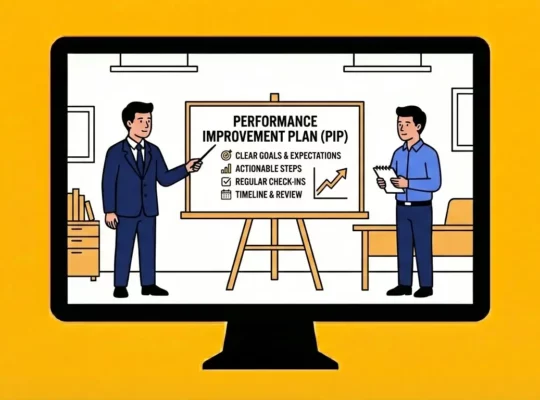When it comes to assessing performance and monitoring objectives, the conduct of an annual individual interview plays a crucial role.
A true pillar of human resources management, an annual individual interview allows a company to evaluate the performance of each of its employees and discuss challenges to promote the professional development of each member as well as the company as a whole.
At the heart of this practice are four essential steps that mark the journey of each interview. This article highlights the course of an annual individual interview, its different stages, and its importance for a company.
Annual individual interview: Definition and challenges
Also known as the annual appraisal interview, the annual one-on-one interview is an essential process in human resource management within companies.
Definition
The annual one-on-one interview is a periodic meeting between an employee and their supervisor during which past performance, objectives achieved, skills developed, and prospects are examined in detail.
The objective is to create a space for open and constructive dialogue between the employee and their manager. This allows the employee’s performance over the past period to be evaluated, their achievements to be recognized, and challenges to be discussed.
In addition, this exchange is often a time to set new goals for the coming period, identify training needs, and discuss professional development opportunities.
The challenges of an annual individual interview for a company
The conduct of an annual individual interview has multiple challenges. Among other things, this exchange must allow the company to:
- Evaluate employee performance regularly;
- Identify skill gaps and put in place targeted training plans to build staff capacity;
- Improve communication between employees and managers through constructive exchanges, discussions on mutual expectations and possible concerns;
- Address individual employee goals and align them with company goals to foster greater consistency and convergence of efforts within the team, etc.
In addition, it is also a valuable tool for talent retention. It allows employees to feel valued and listened to, which can give them great satisfaction at work and make them more loyal to the company.
The interest in employee reviews collected during interviews
The annual individual interview is also a good opportunity for the company to collect employee reviews. These opinions are valuable because they allow the latter to improve their functioning and performance.
They can be used to identify the company’s strengths and weaknesses, to understand employee expectations, and to implement corrective actions.
There are several ways to collect the reviews of a company’s employees during an annual individual interview.
1st method
One of the most common methods is to ask employees to complete an evaluation questionnaire. This questionnaire can cover various aspects of the employee’s professional life such as:
- The work satisfaction;
- The working atmosphere;
- Professional development opportunities, etc.
To guide you, you can consult our article on the questions to ask in a satisfaction questionnaire.
2nd method
Another method is to have an open discussion with the employee. This discussion can focus on the same aspects as the evaluation questionnaire, but it allows for more in-depth and more detailed feedback.
3rd method
The company can also use a trusted platform of employee reviews to collect employee reviews. This type of platform usually allows members of a company to leave anonymous opinions about management and life within the company.
The 4 main steps of an annual individual interview
The conduct of an annual individual interview follows a complex, 4 step process.
1 – Welcome the employee
The most crucial step in conducting an annual individual interview is here. For the success of the face-to-face interview, the manager, from the first minutes, must welcome the employee to establish an atmosphere of trust:
- A comfortable and serene environment;
- An enclosed space, away from prying eyes and ears;
- A non-disturbance instruction except in case of emergency;
- Disabling smartphone notifications or other distractions, etc.
The goal is to make the employee feel more comfortable and inclined to share and give their opinions. But beware, the manager must recall the objective of the interview as well as its progress, including the points discussed and the consequences of the exchange.
2 – Establish the balance sheet of the past year
This stage of an annual individual interview consists of carrying out an annual evaluation concerning the achievement of objectives, any obstacles encountered, complex situations, expectations, feedback, satisfaction, support provided, etc.
For a constructive approach, our article on Annual Maintenance: The Best Questions to Ask should provide you with guidelines for efficient preparation.
In the process of conducting an annual individual interview, it may also be relevant to conduct a questionnaire on working life. Click here to discover the benefits of a quality of life at work questionnaire.
3 – Set new goals and establish an action plan
Also called the “engagement phase”, this stage of an annual individual interview involves close collaboration between the manager and the employee.
The objective is to define together new objectives for the coming year, to identify ways of improvement, as well as the actions to be taken to:
- Strengthen areas identified as weak;
- Increase performance;
- Cultivate skills;
- Make the most of the strengths.
During this stage of an annual individual interview, it is ideal to set SMART objectives, i.e. simple, measurable, ambitious, realistic, and time-bound.
These must be clear, detailed, adapted to the role and expertise of the employee, accessible while motivating, and must be produced within a specific time frame.
4 – Summarize the interview
The course of an annual individual interview ends with a summary written by the manager.
At this stage, the manager is asked to summarize all the key points discussed during the exchange, namely evaluations, strengths, areas for improvement, mutual commitments, and decisions taken for the future.
This synthesis provides a clear and concise overview of the exchanges and resolutions discussed. It also provides a reference document to monitor the commitments and objectives set.
The annual personal interview: Is it a legal obligation?
Contrary to what one might think, the annual evaluation of an employee is not a legal requirement. It is not enshrined in the Labour Code or collective agreements.
However, this practice is widely adopted by French companies, as it is a practical and beneficial instrument for Human Resources management. It benefits both employees and employers.
In any case, if you opt for the implementation of an annual evaluation interview, it is necessary to share this intention with the members of your CSE (Social and Economic Committee) and also to inform your employees.
This is the first real step in the process of conducting an annual individual interview.





